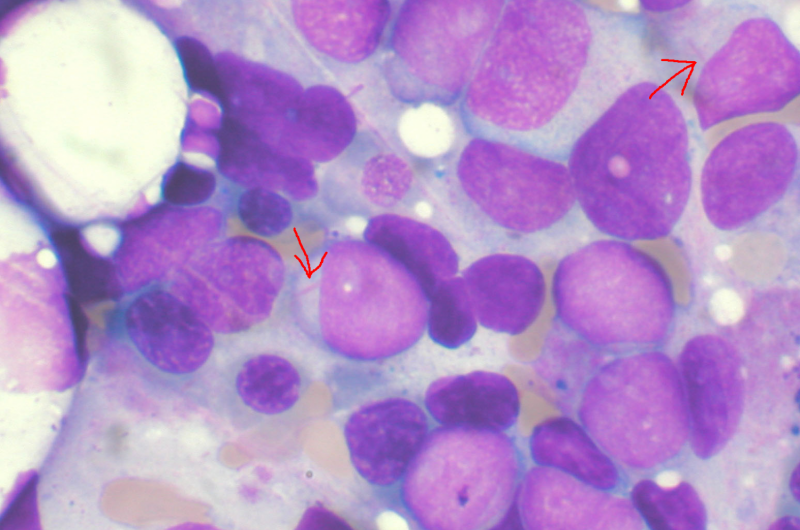This article has been reviewed according to Science X's editorial process and policies. Editors have highlighted the following attributes while ensuring the content's credibility:
fact-checked
peer-reviewed publication
trusted source
proofread
Targeting menin induces responses in acute leukemias with KMT2A rearrangements or NPM1 mutations

Researchers from The University of Texas MD Anderson Cancer Center showed that inhibiting menin with revumenib, previously known as SNDX-5613, yielded encouraging responses for advanced acute leukemias with KMT2A rearrangements or mutant NPM1. Findings from the Phase I AUGMENT-101 trial were published today in Nature.
The overall response rate among 60 patients was 53%, and the rate of complete remission or complete remission with partial hematologic recovery was 30%, with 78% of patients achieving clearance of measurable residual disease. Responses were seen across multiple dose levels. The results originally were presented at the 2022 American Society of Hematology (ASH) Annual Meeting.
"Acute leukemias with KMT2A rearrangements are difficult to treat and NPM1 mutations are the most common genetic alteration in acute myeloid leukemia. These subsets have no specifically approved targeted therapies.," said study lead Ghayas Issa, M.D., assistant professor of Leukemia.
"I am encouraged by these results, which suggest that revumenib may be an effective oral targeted therapy for patients with an acute leukemia caused by these genetic alterations. These response rates, especially rates of residual disease clearance, are the highest we have seen with any monotherapy used for these resistant leukemia subsets."
In KMT2A-rearranged or NPM1-mutant acute leukemias, the interaction of the menin protein with KMT2A (also known as MLL) is critical in driving expression of leukemia-promoting genes. Leukemias with KMT2A rearrangements occur in infants, children and adults, and NPM1 mutations are the most common genetic alteration in acute myeloid leukemia. Preclinical studies suggested that targeting the interaction between menin and KMT2A may be an effective strategy for treating cancers with these mutations.
This is the first evidence showing the safety and clinical activity of menin inhibition in acute leukemia, and the data demonstrate the potential for targeting scaffold proteins that are shown to be vulnerable points in specific cancers. According to Issa, targeting menin disrupts the gene transcription machinery and shifts gene expression in cancer cells from a leukemia pattern to a normal pattern, ultimately leading to remission.
The AUGMENT-101 study is a first-in-human, open-label, dose-escalation and dose-expansion study to evaluate the safety and anti-tumor activity of revumenib—an oral small-molecule inhibitor of the menin-KMT2A interaction—in children and adults with advanced KMT2A-rearranged or NPM1-mutant acute myeloid or lymphoid leukemias.
The trial enrolled 68 patients with a median age of 43, including children as young as 10 months of age. Disease types included acute myeloid leukemia (82%), acute lymphocytic leukemia (16%) and mixed phenotype acute leukemia (2%). Among enrolled patients, 67.6% had KMT2A rearrangements, 20.6% had NPM1 mutations and 11.8% had other genotypes. Patients were heavily pretreated with a median of four prior lines of therapy and 46% had a prior allogeneic stem cell transplant.
The median duration of response was 9.1 months and median overall survival was seven months. Twelve patients proceeded to allogeneic stem cell transplant following response to revumenib.
There were no treatment discontinuations due to treatment-related adverse events.
Differentiation syndrome—an occurrence previously described with other targeted therapies in myeloid leukemias leading to differentiation of leukemia cells into normal hematopoietic cells—was reported in 11 patients. Manifestations of differentiation syndrome in all patients resolved with steroids and/or hydroxyurea, and all were grade 2 or below.
The most common treatment-related adverse event was asymptomatic prolongation of the QT interval on electrocardiography, with a grade 3 rate of 13%. Other grade three or above treatment-related adverse events included diarrhea (3%), fatigue (3%), anemia (3%), tumor lysis syndrome (2%), neutropenia (2%), thrombocytopenia (2%), hypercalcemia (2%) and hypokalemia (2%).
"The responses in this trial show that menin inhibitors may be a promising treatment option that is well tolerated by patients and could be the newest addition to successful targeted therapies for acute leukemia," Issa said. "I look forward to additional data from this and future trials to inform the potential opportunity to offer this targeted treatment to more patients."
Enrollment for the phase II cohort of the trial is ongoing. Future trials of revumenib will test combinations with other agents in various settings, including newly diagnosed leukemias, relapsed or refractory disease, and maintenance therapy, for KMT2A-rearranged or NPM1-mutant leukemias and other leukemias susceptible to menin inhibition.
More information: Ghayas Issa et al, The menin inhibitor revumenib in KMT2A-rearranged or NPM1-mutant leukaemia, Nature (2023). DOI: 10.1038/s41586-023-05812-3. www.nature.com/articles/s41586-023-05812-3


















